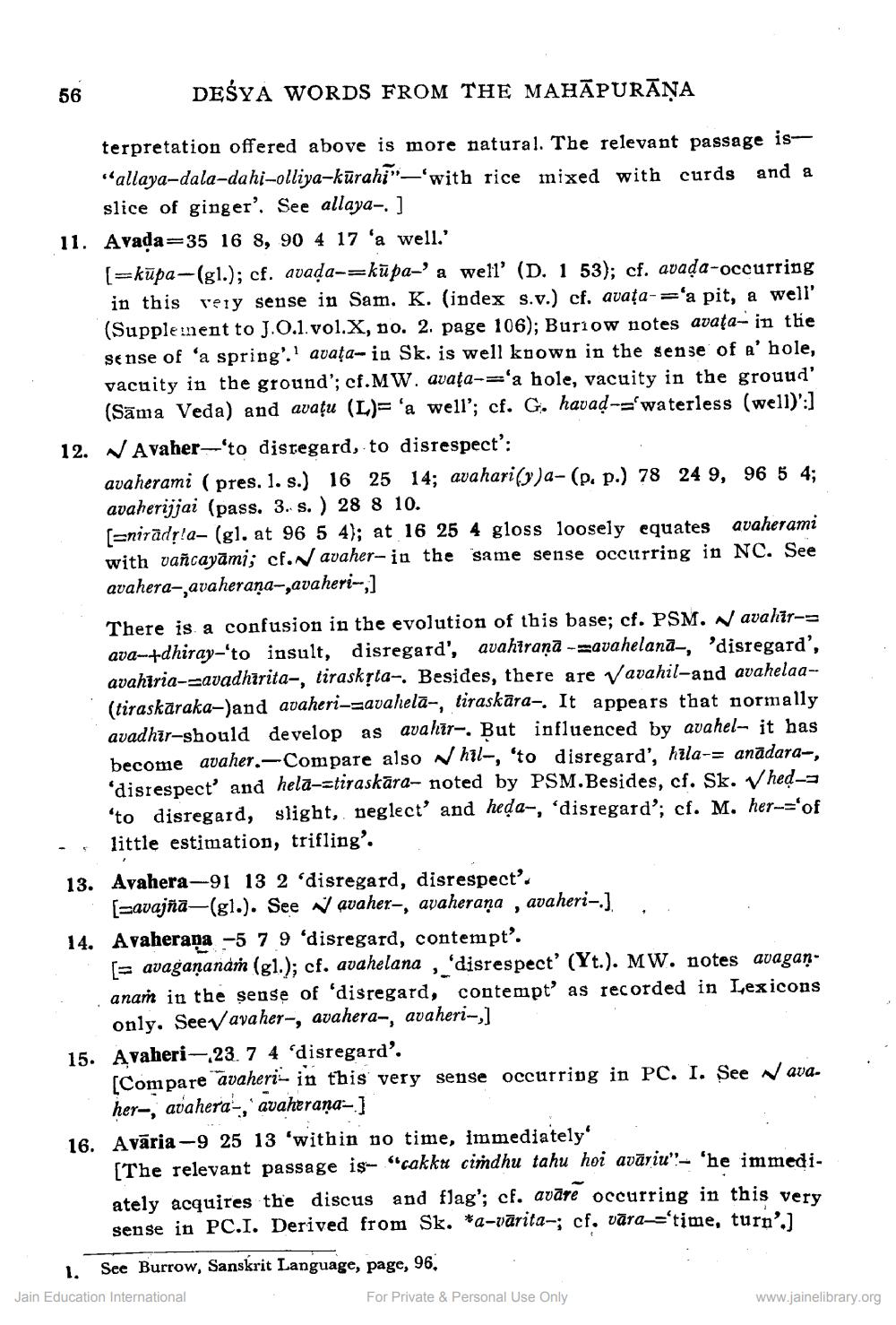________________
56
DESYA WORDS FROM THE MAHĀPURĀŅA
terpretation offered above is more natural. The relevant passage is"allaya-dala-dahi-olliya-kurahi"-'with rice mixed with curds and a slice of ginger'. See allaya-. ]
11. Avada 35 16 8, 90 4 17 'a well.'
=
[-kupa-(gl.); cf. avaḍa--kupa-' a well' (D. 1 53); cf. avaḍa-occurring in this very sense in Sam. K. (index s.v.) cf. avata-'a pit, a well' (Supplement to J.O.1.vol.X, no. 2. page 106); Buriow notes avata- in the sense of 'a spring'.1 avata- in Sk. is well known in the sense of a' hole, vacuity in the ground'; cf.MW. avata-'a hole, vacuity in the ground' (Sama Veda) and avatu (L)= 'a well'; cf. G. havad-waterless (well)':] 12. Avaher-'to disregard, to disrespect':
avaherami (pres. 1. s.) 16 25 14; avahari(y)a- (p. p.) 78 24 9, 96 5 4; avaherijjai (pass. 3. s.) 28 8 10.
[=niradṛta- (gl. at 96 5 4); at 16 25 4 gloss loosely equates avaherami with vañcayami; cf. avaher-in the same sense occurring in NC. See avahera-,avaheraṇa-,avaheri-,]
There is a confusion in the evolution of this base; cf. PSM. avahirava-+dhiray-'to insult, disregard', avahiraṇā avahelana-, 'disregard', avahiria--avadhirita-, tiraskṛta-. Besides, there are Vavahil-and avahelaa(tiraskāraka-)and avaheri-zavahelā-, tiraskāra-. It appears that normally avadhir-should develop as avahir-. But influenced by avahel- it has become avaher.-Compare also hil-, 'to disregard', hila- anādara, 'disrespect' and hela--tiraskāra- noted by PSM.Besides, cf. Sk. √heḍ'to disregard, slight, neglect' and heḍa-, 'disregard'; cf. M. her-='of little estimation, trifling'.
13. Avahera-91 13 2 'disregard, disrespect'.
[avajña-(gl.). See avaher-, avaherana, avaheri-.]
14. Avaherana -5 7 9 'disregard, contempt'.
[=avagananam (gl.); cf. avahelana, 'disrespect' (Yt.). MW. notes avagananam in the sense of 'disregard, contempt' as recorded in Lexicons only. Seevavaher-, avahera-, avaheri-,]
15. Avaheri-23. 7 4 'disregard'.
[Compare avaheri in this very sense occurring in PC. I. See avaher-, avahera, avaherana-]
16. Avaria-9 25 13 'within no time, immediately'
[The relevant passage is "cakku cimdhu tahu hoi avariu" 'he immediately acquires the discus and flag'; cf. avare occurring in this very sense in PC.I. Derived from Sk. *a-varita-; cf. vara time, turn'.]
See Burrow, Sanskrit Language, page, 96,
1.
Jain Education International
For Private & Personal Use Only
www.jainelibrary.org




